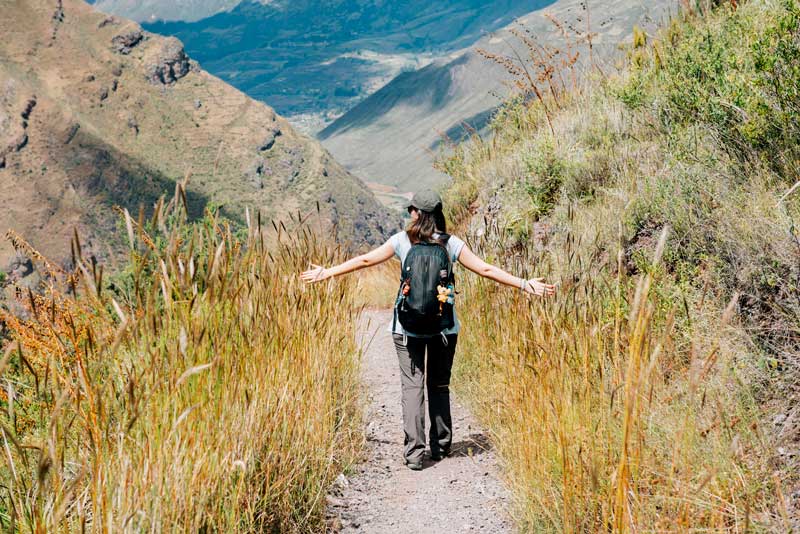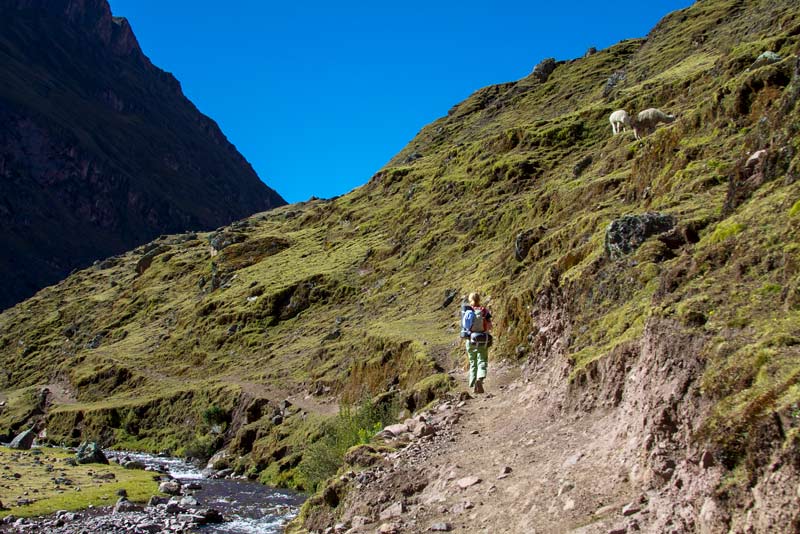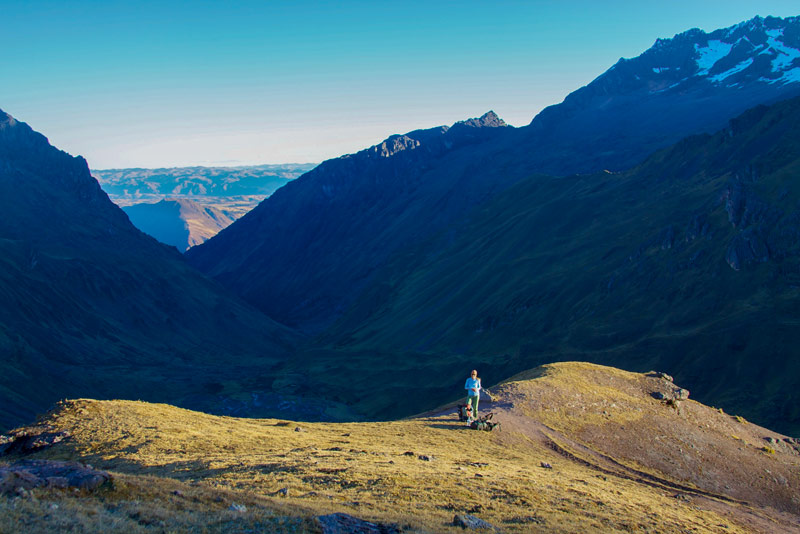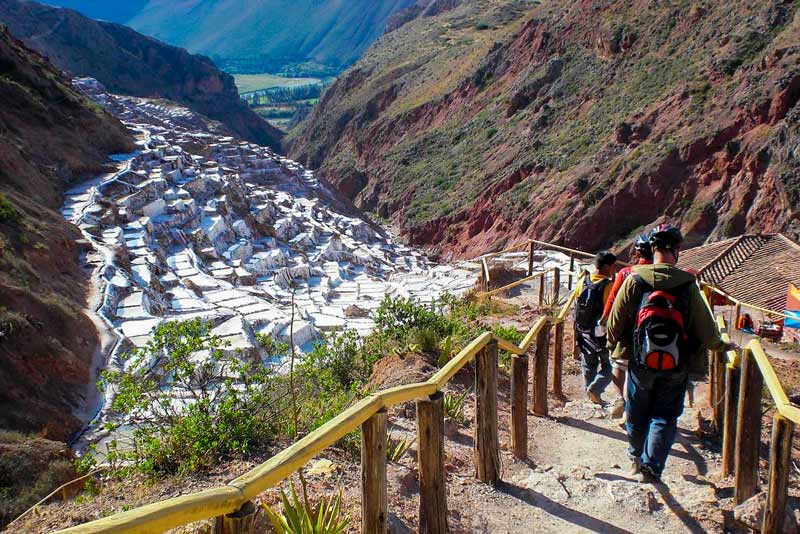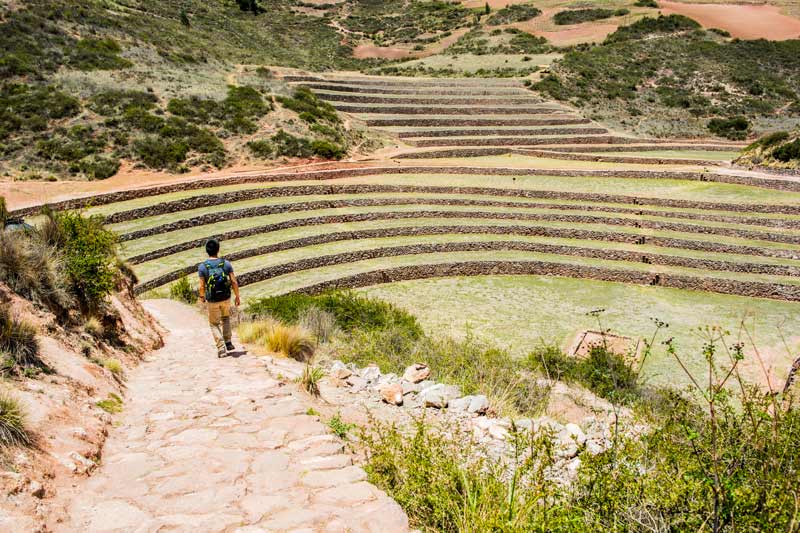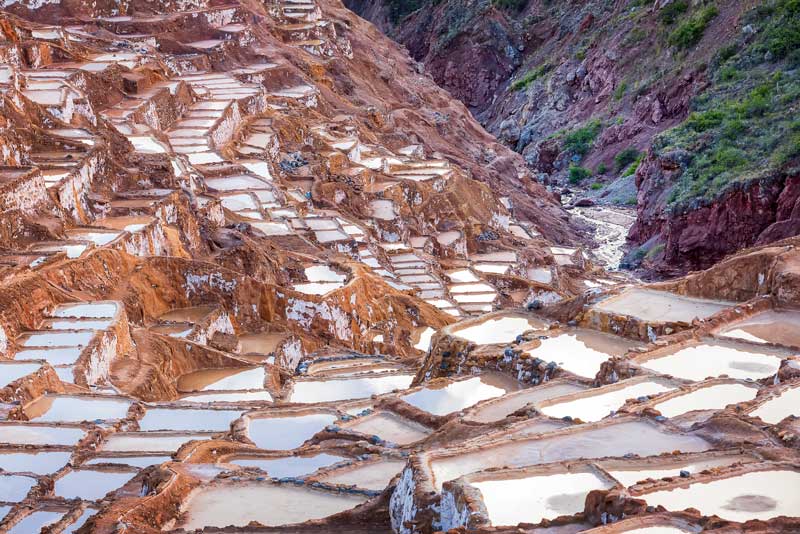Lesser known treks in Cusco for adventurers
Cusco is full of places to explore, from short walks to multi-day adventures. This time, we will present an excellent alternative for those seeking to escape the most popular tourist routes and immerse themselves in the natural and cultural beauty of the region, offering a more intimate experience, away from the crowds, providing the opportunity to enjoy the peace and serenity of Cusco’s majestic landscapes, all while challenging the body and living a unique adventure.
- What are the lesser-known hiking routes in Cusco?
- What difficulty levels do these hikes have?
- How to prepare for an adventurous hike?
- Frequently Asked Questions
Don’t limit yourself to the traditional tourist circuits of Cusco; the lesser-known hikes offer an authentic perspective of the region’s landscapes and culture. Venturing into routes like the Ausangate lagoons or Pitusiray hill will allow you to connect with the tranquility of the Andes and discover spots that few are lucky enough to visit.
What are the lesser-known hiking routes in Cusco?
Lares Trek
Location Description
Throughout the hike in the Lares Valley (Weather and forecast in Lares), adventurers can enjoy landscapes dominated by mountains, green fields, and crystal-clear lagoons. Additionally, it is an opportunity to discover part of the local culture.
Location
The hike starts in the town of Lares, located in the province of Calca, about 150 km from Cusco.
Route Description
The hike typically lasts 3 days. It begins at the Lares hot springs, continues to Huacahuasi (where you can camp or stay with local families), and crosses the Ipsaycocha Pass before descending to the Patacancha Valley. The end of the route can connect with Ollantaytambo, ideal for those wishing to continue to Machu Picchu.
How to Get There
From Cusco, take a transport to Calca (approximately 1.5 hours), and from there, another to Lares (1.5 hours).
Features
The route has an average altitude of 3,500 meters above sea level. It is known for its biodiversity, as it is possible to spot a wide range of flora and fauna. Additionally, it includes a stop at the Lares hot springs, ideal for relaxing before the hiking day.
To Consider
This hike is perfect for those seeking an experience that combines nature, culture, and tranquility. Unlike other hikes like the Inca Trail, here you will find fewer crowds.
Hike to Pitusiray hill
Location Description
Pitusiray hill is an imposing snow-capped mountain located in the Sacred Valley (Sacred Valley of the Incas: Complete Information). The hike offers panoramic views of the valley and provides the opportunity to connect with nature.
Location
It is located near the town of Calca, in the Sacred Valley.
Route Description
The hike is challenging and can take between 7 to 9 hours (round trip). It starts in Calca, crossing agricultural fields and wooded areas before beginning the rocky ascent. Upon reaching the summit, you will be rewarded with spectacular views of the Sacred Valley, surrounding snow-capped peaks, and hidden lagoons.
How to Get There
From Cusco, take a transport to Calca (approximately 1.5 hours). From there, start the hike, which can take between 5 to 7 hours depending on the pace.
Location Features
This hike is demanding due to the altitude, which can exceed 4,500 meters above sea level. The route crosses steep terrain and rocky areas. However, the view from the top rewards the effort with landscapes of snow-capped peaks, lagoons, and valleys.
To Consider
It is ideal for those seeking a physical challenge and beautiful landscapes away from the daily hustle. Additionally, the fresh air and tranquility make it a refreshing experience.
Hike to the Ausangate Lagoons
Location Description
The 7 Lagoons in Ausangate are vibrant-colored waters located at the foot of the highest snow-capped peak in the region. Each lagoon has its own color, ranging from turquoise to emerald green, creating a dreamlike landscape.
Location
It is located in the province of Quispicanchi, near the Ausangate mountain, about 100 km from Cusco.
Route Description
This is a one-day hike that starts in Tinki. The route passes by several lagoons, such as Azulcocha, Patacocha, and Alqacocha, with the option to continue to the Palomani pass if a greater challenge is desired. Views of the Ausangate mountain are impressive throughout the journey.
How to Get There
From Cusco, take a transport to the town of Tinki (3 hours). From there, start the hike to the lagoons, which can take between 4 and 6 hours depending on the chosen route.
Location Features
The average altitude exceeds 4,800 meters above sea level, so it is important to be acclimatized.
To Consider
This is a unique destination for nature lovers, photographers, and hikers. Additionally, the hike allows you to disconnect completely from the urban world and connect with the essence of the Andes.
Hike to Maras
Location Description
This impressive route takes you to the Maras salt mines, a complex of more than 3,000 salt ponds in the mountains.
Location
In the district of Maras, Urubamba province, 40 km from Cusco.
Route Description
The hike can take between 1 and 2 hours, depending on the starting point. From the town of Maras, the trail leads downhill to the salt mines, passing through rural landscapes and offering spectacular views of the Sacred Valley.
How to Get There
From Cusco, take a transport to Urubamba and then to Maras. The hike can start from the town of Maras or from the main junction towards the salt mines.
Features
This is a moderate hike, with a journey of 1 to 2 hours depending on the starting point. Along the way, you will enjoy views of the Sacred Valley and the surrounding snow-capped mountains.
To Consider
The route combines spectacular landscapes with a culturally significant site. Additionally, it is an accessible route for most visitors.
Hike to Moray
Location Description
Moray (Weather and forecast in Moray) is an archaeological site known for its circular terraces. Each level of the terraces has a different microclimate, which allowed the Incas to experiment with cultivating different products.
Location
In the district of Maras, Urubamba province, 50 km from Cusco.
Route Description
The hike from the town of Maras to Moray takes about 1 hour. The trail passes through agricultural fields and offers views of the rural landscape. Once in Moray, you can explore the terraces on foot.
Features
This is a moderate hike, passing through agricultural and rural landscapes. The route offers panoramic views and a tranquil atmosphere.
To Consider
This is an experience that combines history, archaeology, and nature. It is perfect for those who wish to discover the ancient agricultural techniques of the Incas while enjoying the tranquility of the area.
What Difficulty Levels Do These Hikes Have?
| Hike | Difficulty Level | Terrain Features | Recommended For | Approximate Maximum Altitude |
|---|---|---|---|---|
| Lares | Moderate | Rugged terrain with uneven surfaces; narrow paths. | Hikers with moderate experience. | 4,400 meters above sea level. |
| Pitusiray hill | High | Steep slopes and rocky terrain. | Experienced adventurers in good physical condition. | 5,000 meters above sea level. |
| Ausangate Lakes | Moderate to High | Rocky paths with some challenging sections. | Hikers with moderate experience and good stamina. | 4,850 meters above sea level. |
| Maras | Low | Wide paths with few inclines. | Beginners or families seeking a relaxed hike. | 3,385 meters above sea level. |
| Moray | Low to Moderate | Dirt paths with gentle ascents. | Beginners or those looking for an easy hike. | 3,500 meters above sea level. |
How to Prepare for an Adventurous Hike?
To prepare for a hike, you need to consider many factors, as it can be risky, especially if you are unfamiliar with the terrain or not fully acclimatized. Below are a series of recommendations to take into account before embarking on a hike.
Pre-Hike Acclimatization
Cusco is located at 3,400 meters above sea level, and many hikes reach even higher altitudes.
- Recommendation: Spend at least 2 or 3 days in the city of Cusco before starting a hike to allow your body to adjust to the altitude.
- Extra Tip: During this time, avoid alcohol and engage in light activities to help your body adjust.
Proper Equipment
Bringing the right gear can make all the difference in your experience.
- Clothing: Choose layered clothing that allows you to adjust to temperature changes. Bring a waterproof or windproof jacket and ensure you wear comfortable, breathable pants.
- Shoes: Boots or shoes with good grip are essential for rugged terrain.
- Accessories: Don’t forget a hat, gloves, sunscreen, sunglasses, and a sun hat.
Hydration and Food
Staying hydrated is crucial at high altitudes.
- Water: Carry at least 1.5 liters of water per day. Consider bringing a portable filter if the hike is several days long.
- Food: Pack energy snacks like nuts, granola bars, and dried fruits.
Physical Preparation
Although you don’t need to be an athlete, being in good physical condition will help.
- Recommendation: Take short hikes or hill climbs in the days leading up to the hike to improve your endurance.
- Extra Tip: Practice with the equipment you plan to carry to get used to the weight.
Hire a Guide or Join an Organized Tour (Optional)
While many routes can be done independently, having a guide can enrich the experience.
- Advantages: You’ll learn about the history, geography, and local traditions. It’s also safer, especially on less known routes.
First Aid Kit
It’s important to be prepared for minor emergencies.
- Include: Basic medications (ibuprofen, paracetamol), bandages, plasters, insect repellent, and altitude sickness pills.
Weather and Route Check
The weather in Cusco can be unpredictable, especially during the rainy season (November to March).
- Recommendation: Check the weather forecast before heading out and adjust your gear according to the conditions.
- Extra Tip: Bring a physical map or download a navigation app in case you lose connection.
Environmental Responsibility
Help preserve the natural landscapes.
- Recommendation: Carry a bag for your trash and use biodegradable products.
- Extra Tip: Respect local communities and follow established rules.
Positive Attitude and Patience
An adventurous hike is not only physical but also mental.
- Recommendation: Maintain a positive attitude and enjoy the journey, even if there are challenges.
- Extra Tip: Take breaks when needed and admire the landscapes around you.
Take advantage of these hikes to learn about the communities living around Cusco. Many of these routes pass through villages where you can talk to locals, taste their traditional food, or hear their stories. Your experience will be much more enriching by immersing yourself in the living culture of the Andes.
Frequently Asked Questions
1) Is it necessary to hire a guide for the hikes?
It’s not always mandatory, but it’s recommended, especially for long or difficult hikes like Pitusiray hill or the Ausangate Lakes. A guide can ensure your safety, provide cultural insights, and help with navigation on less-marked routes.
2) How long should I acclimatize before doing a hike?
It’s recommended to acclimatize for at least 2 or 3 days in Cusco before starting a hike, especially if it reaches altitudes higher than 4,000 meters. This helps prevent altitude sickness.
3) What’s the best time to hike in Cusco?
The dry season (April to October) is the best time for hiking, as the weather is more stable with less chance of rain. During the rainy season (November to March), routes can become slippery and challenging.
4) What level of physical fitness do I need for these hikes?
It depends on the hike:
- Hikes like Maras and Moray are low to moderate level, ideal for beginners.
- Hikes like Lares, Ausangate Lakes, and Pitusiray hill require intermediate to advanced fitness due to the altitude and rugged terrain.
5) Can I do these hikes with children?
Shorter and more accessible hikes like Maras and Moray are suitable for families with children. However, more demanding routes like the Ausangate Lakes are not recommended for small children due to the altitude and difficulty.
6) Is there phone signal or internet on the routes?
In most hikes, phone signal is limited or non-existent, especially in remote areas like the Ausangate Lakes. It’s advisable to download offline maps or use GPS navigation devices.
7) Are there accommodation options on the routes?
Some hikes, like Lares, offer accommodation in local houses or organized camps. For other routes, like the Ausangate Lakes, camping or returning to a nearby town at the end of the day is typically required.
8) Do I need permits for these hikes?
Most lesser-known hikes do not require special permits, but areas like the Ausangate Lakes may have entrance fees managed by local communities.
9) How far in advance should I book a hike?
For independent hikes, it’s not necessary to book far in advance. However, if you want to join an agency or hire a guide, especially during high season, it’s recommended to book at least a week in advance.
Advice from people who have been there
 By: Emil S.
By: Emil S.“Connection at the heights of Pitusiray Hill“
“Climbing Pitusiray hill was one of the most challenging and rewarding experiences of my trip to Cusco. Reaching the summit, with its breathtaking panoramic views and unique energy, made me feel in complete connection with the grandeur of Andean nature.“
By Ticket Machu Picchu – Last updated, January 29, 2025
